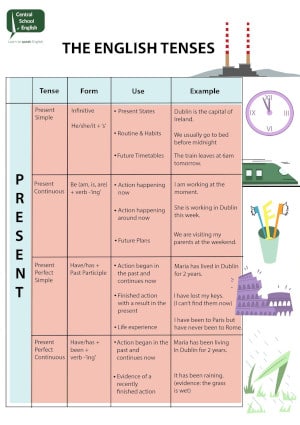Direct and Indirect Speech

Welcome to another Central School of English grammar blog post. In this post we’ll be looking at direct and indirect speech.
We often need to repeat what someone has told us. This is how we pass on information to other people. Maybe we need to tell our classmates about some homework or maybe we have heard a juicy piece of gossip, which often spreads like wildfire! Of course, in the digital age information can be passed on faster than ever by sharing a post on social media. Videos, photos and stories can go viral – often with surprising consequences!
In this blog post we’ll look at the more traditional ways of passing on information – by word of mouth and the written word. When we do this we generally use direct or indirect speech. So, without further ado, let’s get stuck in!
Direct and indirect speech
In the real world, outside of grammar books (and blogs!), all language is used in a particular context. Sometimes it can be difficult to take the grammar structures we have studied and use them in the real world. Examples given in some grammar books are rarely used in reality. So in this blog, I’ll try to keep it real!
When we speak in daily life most of what we say is in direct speech. Direct speech is nothing special. It’s just the way we normally speak! For example:
I’m going to work now. See you later!
What time will we meet?
Have you watched that movie on Netflix yet?
When we want to pass on information and tell somebody what another person said we generally use indirect speech. Indirect speech is also known as reported speech. This is because we are reporting what someone has said. There are situations when we might use direct speech to repeat what someone has said, but this is not very common in spoken English.
So what’s the difference between direct and indirect speech? Let’s illustrate this with an example. Imagine it’s your new roommate’s birthday and you want to surprise her by ordering a take-away for dinner. You and another roommate are planning the take-away. You might have a conversation like this:
You: What kind of food does she like?
Roommate: She said that she liked pizza.
You: Great, let’s order pizza then!
The sentence ‘She said that she liked pizza’ is an example of indirect speech. The exact words of your new roommate were probably ‘I like pizza’. But it would sound quite strange if we used direct speech in the conversation and said:
She said ‘I like pizza’.
So we generally use indirect speech when repeating what someone has said. The rule of thumb for forming a sentence in indirect speech is:
Move the verb tense one step back into the past.
In the above example the present simple:
I like pizza
is changed to the past simple:
She said that she liked pizza.
We generally omit the word that when we use indirect speech, so in the above example we would normally say:
She said she liked pizza.
Present Simple
Here are some more examples of reporting present simple sentences:
Direct speech : I live in Dublin.
Indirect speech: He said he lived in Dublin.
Direct speech: I don’t enjoy dancing.
Indirect speech: He said he didn’t enjoy dancing.
Direct speech: I have two sisters.
Indirect speech: She said she had two sisters.
Notice that we generally use the verb said in indirect speech. It is also possible to use the verb tell but as always we have to follow the verb tell with someone’s name or a pronoun. For example:
She told me she liked pizza.
He told Jane he didn’t like dancing.
Present Continuous
Now let’s look at a different tense – the present continuous. When we change a statement from the present continuous to indirect speech, we must use the verb ‘said’ and change the verb in present continuous into the past continuous
For example:
Direct speech: (present continuous) I am working
Indirect speech:(past continuous) She said she was working
Direct speech: They are playing
Indirect speech:He said they were playing
Direct speech: I am not listening
Indirect speech: He said he wasn’t listening
Present Perfect
When we change a sentence in the present perfect from direct speech into indirect speech we generally use the verb ‘said’ and change the verb in the present perfect into the past perfect tense
For example:
Direct speech: I have eaten breakfast.
Indirect speech: He said he had eaten breakfast.
Direct speech: They have gone home.
Indirect speech: She said they had gone home.
Direct speech: I’ve never visited Paris.
Indirect speech: She said she’d never visited Paris.
Past Simple
When we change a sentence in the past tense from direct speech into indirect speech, we generally use the verb ‘said’ and move the verb one tense into the past. This means we change the past simple to the past perfect.
For example:
Direct speech: I worked last night.
Indirect speech: She said she had worked last night.
However, with the past simple it’s quite common to keep the verb in the same tense. For example:
Indirect speech: She said she worked last night.
Here’s another example:
Direct speech: I did my homework.
Indirect speech: She said she had done her homework.
or
She said she did her homework.
Indirect speech and questions
When we change a question from direct speech into indirect speech, we move the verb one step into the past and we use the verb ‘asked’ instead of ‘said’.
For example:
Direct speech: Where do you work?
Indirect speech: She asked where I worked.
Notice that we do not use the question form. This means we don’t say:
She asked me where did I work.
We do say:
She asked me where I worked.
Here are some more examples:
Direct speech: Why are you here?
Indirect speech: She asked why I was here.
Direct speech: What time are you leaving?
Indirect speech: He asked what time I was leaving.
‘Yes’ or ‘No’ Questions
If we are asking a ‘yes’ or ‘no’ question, changing direct speech to indirect speech is a little different. ‘Yes’ or ‘No’ questions have the structure Auxiliary verb + subject + verb. For example:
Do you have a sister?
Have you ever been to Paris?
When we change a ‘yes’ or ‘no’ question to indirect speech we follow the rule with the verb (one step back in the past) and we use the words ‘if’ or ‘whether’. We don’t use the question form. For example:
Direct speech: Do you have a sister?
Indirect speech: She asked if (or ‘whether’) I had a sister?
Here are some more examples:
Direct speech: Are you going home tonight?
Indirect speech: He asked if I was going home tonight.
or
He asked whether I was going home tonight.
Direct speech: Are you watching the movie?
Indirect speech: He asked if I was watching the movie.
Direct speech: Are you going to study tonight?
Indirect speech: She asked whether I was going to study tonight.
Indirect Speech
- We use indirect speech to report what someone has said
- To form indirect speech we put the verb one tense back in the past
- We generally omit the word that
- We don’t use the question form
- We don’t use inverted commas (“”)
Using direct speech to report what someone has said
As we have seen, when we report what someone has said we generally use indirect speech. However there are some situations when we use direct speech.
One situation when we use direct speech is when we are repeating the famous speeches or statements or “quoting” someone. For example:
Martin Luther King said “I have a dream”.
In the words of Oscar Wilde “I am not young enough to know everything”.
Indirect speech is also used in fiction writing. If you read a novel or short story it will probably be written in the past tense and conversations will be written using direct speech. For example:
“Are you leaving now?” he asked.
“I’m afraid so. If not I’ll miss the train,” she replied.
Test Yourself
Direct and Indirect Speech Video
Vocabulary
Juicy gossip: Useful or shocking information about someone’s private life
The written word: Language in written form
To predict: To make a statement about the future
Without further ado: Without delay
Phrasal Verbs
To pass on : To give information or knowledge to another personExample: I’ll pass your email address on to my boss.
To get stick in : To begin doing something at once with enthusiasm Example: I can’t wait to get stuck in to this book.
Idioms
Spread like wildfire: To circulate very quickly Example: The coronavirus has spread like wildfire in some big cities
Go viral: To quickly circulate on the internet Example: I posted a cat video on Youtube last week. It’s gone viral – one million views already!
Word of mouth: Sharing information by speaking Example: I heard of the school through word of mouth.
Keep it real: To remain honest and authenticExample: Many hip-hop artists like to keep it real. They sing about their real life experiences.
Rule of thumb: A general guideline Example: As a rule of thumb I try to sleep for eight hours every night.
Thank you for reading our post. You’ll find more English grammar tips elsewhere on our site and if you’d like information on our English courses in Dublin, please do not hesitate to contact us.





